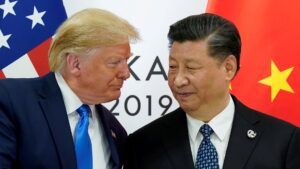Will Tariffs Hinder U.S.-China Economic Relations? Insights from Extreme Investor Network
The economic landscape between the United States and China has been fraught with tension, particularly regarding trade policies and tariffs. As we look at recent developments, it’s essential for investors and stakeholders to understand the implications of potential tariff increases, particularly as they digest news from the G20 summit and beyond.
What’s Happening?
In a significant move, U.S. President Donald Trump recently hinted at possibly imposing a 10% tariff on Chinese goods, effective February 1. This announcement comes on the heels of the White House launching an investigation into China’s practices that are reportedly detrimental to U.S. commerce. Amid these discussions, China’s Ministry of Commerce has been vocal about its commitment to negotiation and open communication with U.S. authorities.
China’s Response: A Call for Cooperation
China’s representatives have emphasized the importance of dialogue. He Yadong, spokesperson for China’s Ministry of Commerce, stated that China hopes to "strengthen dialogue and communication" under the strategic guidance of the two nations’ leadership. Not only does this suggest China is open to negotiations, but it also signals the country’s desire for a cooperative relationship that bolsters both economies.
In discussions with Trump, President Xi Jinping reinforced the notion that U.S.-China economic ties should be mutually beneficial. As investors, it’s crucial to interpret these statements not just as diplomatic niceties but as strategic positions that could affect market dynamics.
Understanding Tariffs: A Global Perspective
He Yadong also remarked that tariffs could be detrimental not only to China and the U.S. but to the global economy as a whole. This perspective raises key questions about the broader impact of such policies. Rather than viewing tariffs as a means to protect domestic markets, we should consider their ripple effects on global supply chains, consumer prices, and overall economic stability.
While a 10% tariff might seem mild compared to the earlier proposed 60%, it’s still a notable change. Historically, businesses have had to adjust to tariffs through price hikes, cost-cutting, or even reconfiguration of supply chains. Investors should keep a close eye on how companies adapt, as this will likely impact stock performance and market confidence.
The TikTok Conundrum
The implications of trade negotiations have extended beyond traditional goods and services, impacting technology platforms like TikTok. Trump has indicated that increased tariffs could pressure ByteDance, TikTok’s Chinese parent company, to divest its U.S. operations. This pivot toward tech, revealing national security concerns over data privacy, introduces a new layer of complexity into trade negotiations.
China hopes that the U.S. will consider the voices of businesses and the general public in its decision-making processes, aiming for actions conducive to economic cooperation. For investors, this highlights how consumer sentiment and social media platforms are becoming intertwined with international economic policies.
A Balanced Approach
Despite the uncertainties surrounding U.S.-China trade relations, it’s evident that both nations recognize the mutual benefits of cooperation. As supporters of "win-win cooperation," Chinese officials underline the goal of developing a stable, healthy, and sustainable economic relationship.
Investors must navigate this complex landscape with a keen understanding of both countries’ aspirations. By keeping abreast of economic indicators and diplomatic updates, stakeholders can better anticipate market shifts, make informed decisions, and capitalize on emerging opportunities.
Conclusion
At Extreme Investor Network, we believe that understanding the nuances of international trade relations is crucial for making sound investment decisions. The dialogue between the U.S. and China is ongoing, and while the specter of tariffs looms large, the commitment to negotiation and cooperation offers a glimmer of hope for stability in global markets.
Stay tuned to our insights for more updates on this evolving situation, as we strive to provide our readers with the most actionable and in-depth financial content available. Whether you’re a seasoned investor or just starting out, understanding the implications of these developments will empower you to navigate the investment landscape more effectively.

